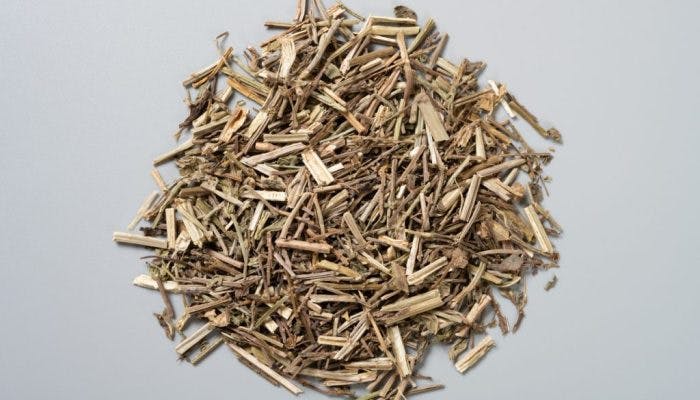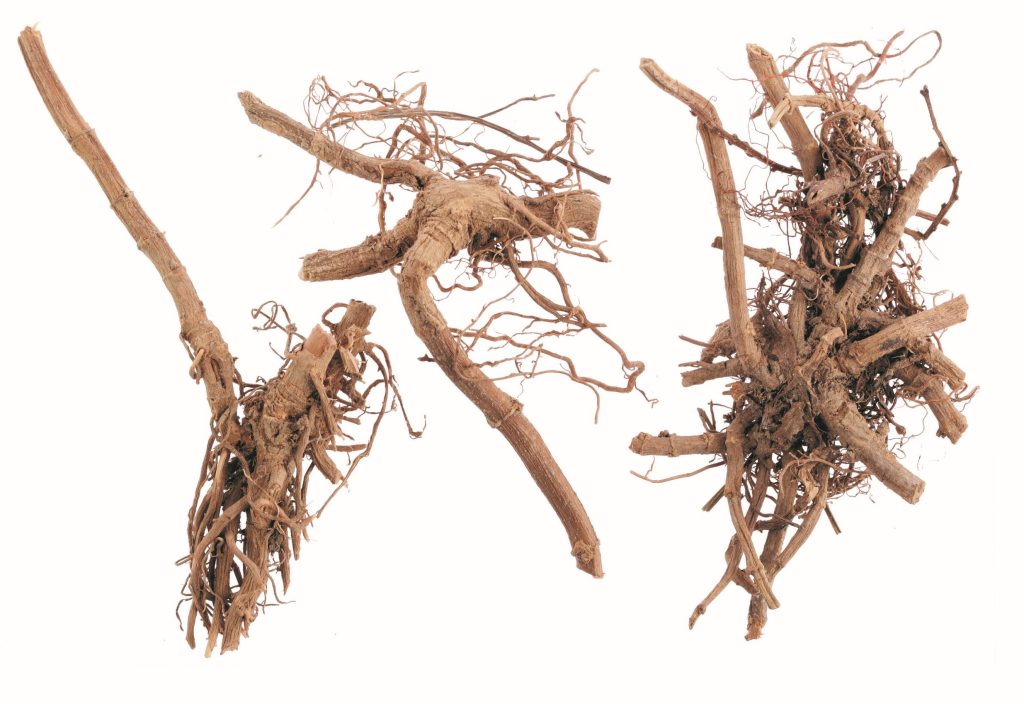Verbena Leaves (Ma Bian Cao)

What are Verbena Leaves (Ma Bian Cao)?
Verbena Leaves (ma bian cao, 马鞭草), also known as European Verbena Herb, comes from the plant Verbena officinalis, a perennial herb native to Europe and Asia. Belonging to the Verbenaceae family, this plant has lobed, toothed leaves and silky, pale purple flowers.
For thousands of years, Verbena has been revered by ancient cultures throughout Europe for its medicinal, ceremonial and superstitious uses, which gave it nicknames such as ‘the herb of love’ and ‘herb of the cross’.
In Christian traditions, the herb is said to have healed the wounds of Christ inflicted by the crucifixion. In Ancient Egypt, it was said that Verbena sprung out of the ground when the goddess Isis shed tears to mourn the death of the god Osiris. The Romans called the herb ‘herba sacra’ and the Ancient Greeks called it ‘heirobotane’ or ‘holy plant’. In fact, Verbena was used by these cultures to brush temple altars.
In the Middle Ages, the herb was often used in potions to attract protection and act as an aphrodisiac. Verbena was also known to be a powerful protection against vampires. It was said that if a vampire had physical contact with the herb, it would burn them.
In Traditional Chinese Medicine (TCM), Verbena Leaves fall under the category of ‘Herbs that clear Heat and relieve toxicity’. Such herbs are used to clear inflammatory and infectious conditions referred to as Internal Heat in TCM. Cool in nature, Verbena Leaves can help individuals who have too much Heat in their body, such as those experiencing a Yang Excess or a Yin Deficiency, to restore a harmonious yin-yang balance.
Bitter in taste, the herb can cleanse the body by clearing Heat, drying Dampness and promoting elimination via urination or bowel movements. In particular, Verbena Leaves targets the Spleen and the Liver.
Functions and Benefits of Verbena Leaves (Ma Bian Cao)
Traditional Chinese Medicine (TCM) shows that Verbena Leaves have the following health benefits.
Verbena Leaves can invigorate and cool blood to reduce abdominal masses. This herb can be indicated for dysmenorrhea or amenorrhea caused by Blood Stasis. Verbena Leaves can clear Heat and remove toxicity as well, and is thus indicated for symptoms such as sore throat, breast abscess and swollen, painful gums.
Verbena Leaves is effective in promoting diuresis to resolve internal blockage of Dampness with edema or ascites. The herb can help to check malaria disorders too.
Modern studies suggest that Verbena Leaves may possess anti-tumour effects. The herb contains glycosides, triterpenoids and essential oils that may inhibit tumour growth and induce the death of cancerous cells. Other studies show that Verbena Leaves may protect nerve cells and benefit certain neurological conditions.
Long been used in folk medicine as a relaxant or a nerve tonic, Verbena Leaves may help to reduce anxiety and convulsions as well. Researchers identified that Verbena Leaves contain flavonoids and tannins which are known to possess anti-anxiety and sedative properties. Some studies also demonstrated that these Verbena Leaves may help to manage convulsions or seizures in those with neurological diseases such as epilepsy.
Verbena Leaves may contain antimicrobial activity, as it may protect against antibiotic-resistant bacteria and fungi. The herb is also useful in treating acute and chronic inflammation of the sinuses and respiratory tracts.
Traditionally used as a galactagogue, Verbena Leaves may help to increase milk production in breastfeeding women. However, there is not enough current scientific evidence to support this claim.

How to Use Verbena Leaves (Ma Bian Cao)
The recommended daily dosage of Verbena Leaves is 15 – 30g when used as a decoction, 30 – 60g when used fresh or made into pill or powder.
Other than consuming it, some people also apply Verbena Leaves directly to the skin to treat abscesses and itching. You may also gargle water with Verbena Leaves, it is believed that doing so may relieve conditions of the mouth and throat.
Cautions and Side Effects of Verbena Leaves (Ma Bian Cao)
Verbena Leaves should not be used by individuals who are experiencing Yin Deficiency in the Spleen or Qi Deficiency in the stomach.
Animal studies have shown that consuming Verbena extract during pregnancy may lead to poor weight gain and fetal abnormalities like reduced bone ossification. Pregnant women should not take this herb as uterine contractions may be triggered. Other side effects associated with Verbena include the inhibition of iron absorption and the lessening of blood-thinning drugs’ effects.
We strongly encourage you to consult your healthcare provider before adding Verbena Leaves to your healthcare routine.
Summary
Here is a summary for Verbena Leaves (Ma BIan Cao):
- Herb name (Chinese): 马鞭草
- Herb name (Pin Yin): mǎ biān cǎo
- Herb name (English): European Verbena Herb
- Herb name (Botanical): Herba Verbenae
- Origin of species: Verbena officinalis L.
- Part(s) of herb used: Plant parts above ground
- Geo-specific habitat(s): Shanxi, Shaanxi, Gansu, Xinjiang, Jiangsu, Anhui, Zhejiang, Jiangxi, Fujian
- Taste(s) & Properties: Bitter; Cool; Administrates the Liver and Spleen Meridians
- Actions: Eases inflammation or painful sore throat; Relieves menstrual pain or abdominal masses by removing Blood Stasis; Relieves water retention; Aids in treatment of symptoms of jaundice and malaria
References
Bekara, A., Amazouz, A., & Douma, T. B. (2020). Evaluating the antidepressant Effect of Verbena officinalis L.(Vervain) aqueous extract in adult rats. Basic and Clinical Neuroscience, 11(1), 91-98.[Accessed on 7th January 2023]
Casanova, E., García-Mina, J. M., & Calvo, M. I. (2008). Antioxidant and antifungal activity of Verbena officinalis L. leaves. Plant foods for human nutrition, 63(3), 93-97. [Accessed on 7th January 2023]
Share this article on
